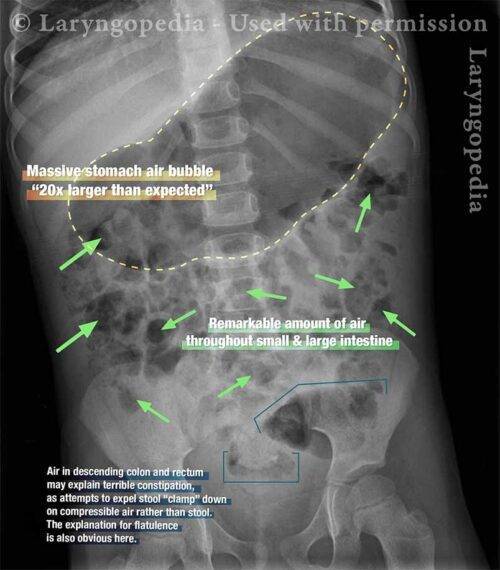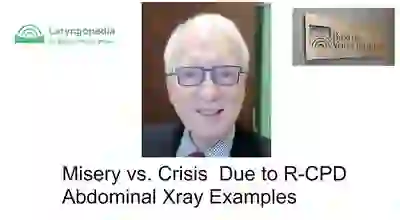Why Is Constipation Often a Symptom of Retrograde Cricopharyngeus Dysfunction (R-CPD)? A Thought Experiment
Introduction
Retrograde cricopharyngeus dysfunction is also known by three other names: R-CPD; inability to burp and associated symptoms, or “no-burp.” Because of the inability to burp, the normal air that everyone swallows with food, liquid, or saliva can only be released as flatulence. (Gas formed during digestion of food such as beans and cabbage has only one way to exit in every human.)
In some people with R-CPD, the amount of air swallowed is excessive. It seems that the distressing symptoms of R-CPD (bloating; gurgling; nausea; hypersalivation; hiccups, etc.) lead to “extra” swallowing that they may not even be aware of. Consequently, no-burpers inadvertently “inflate.”
When the volume of un-burpable air becomes excessive, the abdomen bloats and even distends. Especially when the speed of transit of GI air all the way to the rectum is very fast, the person can experience extraordinary, “world class” flatulence.
Of course, no-burpers may not permit themselves to pass gas whenever they want to, due to other people being near. And if flatulence is “held,” such as during a meeting in the workplace, the colon and rectum can dilate remarkably.
Such dramatic stretching of the colon thins the muscle within its wall, making that muscle less effective in “propulsion” whether of gas or stool.
How does R-CPD cause or increase constipation?
First, consider that air is far more compressible than stool. If the colon is overfilled with air, when both abdominal musculature and colon /rectum wall contract to produce a bowel movement, those muscles may act primarily to compress the flatulence rather than to propel the stool.Flatulence can precede the bowel movement, but the sheer volume of flatulence in persons with R-CPD may mean that the colon/rectum are never effectively completely emptied of gas.
It is true of course that constipation is common due to the Western diet. Still, our observation is that it seems even more common in persons with R-CPD. This came to attention after hearing many patients successfully treated for R-CPD say “My constipation is way less!”
And so… the above thought process and the accompanying photos explain why that might be so.
 Children with R-CPD Need Champions
Children with R-CPD Need Champions
This four-year-old is an example of the many young children who fulfill the criteria for a diagnosis of R-CPD, but who cannot find a doctor to help. Her parents also say the following: “She was impossible to burp as an infant. She only eats small amounts, stopping due to discomfort, and is falling behind developmental markers (especially weight). Her abdomen blows up like a balloon each day. She requires daily laxative use, and passes a long stream of flatulence before moving her bowels.”
This child precociously describes what is clearly throat nausea, and speaks of trouble breathing and too much “throat water.” When she has hiccups (once a week or so), they hurt a lot.
For her age, this child has undergone significant testing and dietary manipulations, even medications, without any significant benefit. The friction and delay in the medical system of this family’s large city is so great, and the child’s (and her parents’) distress so intense that they are traveling hundreds of miles for the care of a physician who will treat expeditiously based upon the syndrome alone.
Share this article

Excessive Flatulence
The purpose of this video is to introduce those with excessive flatulence (gassiness) to a potential explanation they may not have encountered before: retrograde cricopharyngeus dysfunction (R-CPD).
Persons with R-CPD typically say that in addition to flatulence, they can’t burp, experience socially-awkward gurgling noises, and experience abdominal bloating. Treatment of R-CPD can dramatically reduce flatulence in this group of persons.

Misery vs. Crisis from Inability to Burp
Why do persons with R-CPD experience such daily misery? These X-ray images provide the explanation, as well as the rare “abdominal crisis” in this group is also explained.
Dr. Bastian discusses various photo essays found across Laryngopedia, and provide in-depth descriptions on their origins and what is going on behind the scenes during the time of capture.
